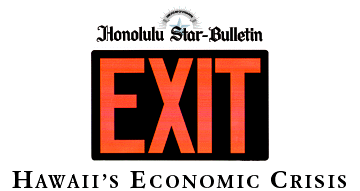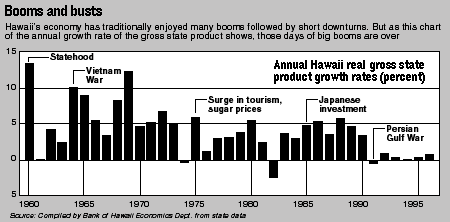

Part 1: It's lean, it's mean and it's chasing
many employers away. Hawaii slouches toward
the new century with a new economy that promises
none of the boom times of yesteryear.
By Ken Ige, Star-Bulletin
Gordon "Pops" Moore runs his Pops Pawn Shop in
Waipahu with the help of daughter Karin Takahashi.
Moore says he sees an economy that has gone
from sluggish to stalled.
Boom gone bust
Unlike decades past, the
By Richard Borreca
economic forecast for today's Hawaii
is slow growth
Star-BulletinWelcome to the new Hawaiian economy, where dumb luck and a 747 roaring in from Japan won't save us anymore. Welcome to an economy unforgivably lean, international and interconnected. Welcome to steady, slow growth, where businesses banking on a boom are going bust.
Standing at the window of his 29th-floor office in the new First Hawaiian Center, Walter Dods, First Hawaiian Bank's president and CEO, says flatly that the rules have changed.
Sitting in a golf cart surveying the empty rows at his Aloha Flea Market emporium, Edwin Medeiros agrees.
And out in Waipahu, Gordon "Pops" Moore is making $50 loans at his pawnshop, feeling the effects of a pinched economy that no one here has seen before.
The decline of big-time agriculture in Hawaii, the failure of tourism to fully rebound from its early 1990s slump, and the corporate world's affinity for cutting costs are some of the recent trends that have contributed to this lean new economy.
Even the state agrees things have changed.
"It now appears that prolonged and fundamental changes in underlying economic conditions may affect Hawaii growth potential and make it difficult for us to attain the high rates of real economic growth of the past," Gov. Ben Cayetano said in last year's economic briefing.
In a recent interview, Cayetano was more direct, saying that the construction industry, among others, must learn to cope with slow growth.
"We have got to have our people understand that the good old days are gone," Cayetano said.
"I don't think we will see the kind of building we had in the past. So we got to make the transition and create jobs in other areas."
Worst income growth in nation
A new public opinion poll commissioned by the Honolulu Star-Bulletin shows that the overwhelming majority of local residents agree. More than two-thirds think there has been a fundamental change in the Hawaiian economy, while only 30 percent consider the nearly seven-year slump to be part of the normal up-and-down cycle of business.As if to mock a state that once prided itself on being "recession-proof," mainland states are soaring while Hawaii's economy has flamed out.
Hawaii had the worst income growth in the nation last year, according to the U.S. Commerce Department. For the nation, the per capita growth was 4.5 percent, more than double the 2.2 percent national inflation rate.

But, Hawaii's per capita growth rate was the slowest, only 1.7 percent.Across the nation, average state tax collection grew 6 percent in the first quarter of 1997. State budgets, almost everywhere except here, are showing a surplus, according to the Rockefeller Institute's Center for the Study of the States.
"There is a fair amount of growth everywhere. States have been doing real well for revenue and a lot of states are swimming in revenue they didn't forecast," said Elizabeth Davis, senior analyst with the center.
Yet Hawaii lags. Last year Hawaii was one of only five states to cut its work force and operations to save money. To make matters worse, a Census Bureau survey found that poverty in Hawaii is rising while income levels are dropping. Those numbers are reversed for most of the country, where poverty is shrinking and income is rising.
According to Dods and his bank's economist, Leroy Laney, Hawaii will grow only about 1.8 percent a year.
"It is time expectations here adjusted to this lower potential," Laney said.
Author and former University of Hawaii Business School dean David Heenan, who is now a Campbell Estate trustee, calls Hawaii's shift in focus "profound." He ticks off four reasons for the shift: global competition, technological changes in communications and production, decentralized companies and a move to consumer pricing.
Besides, Hawaii simply is no business paradise. "Looking outside in at Hawaii: It is a niche market, it is a pain to service. It is a high-cost market. Land, labor and capital are all expensive. And there are the social costs of government structure that is bloated and expensive," says Heenan, who is also a former chairman and CEO of Theo. H. Davies.
Boom of 1980s a faint memory
During the last big boom of the 1980s, Hawaii just couldn't help but make money, Heenan said. Now, however, the profits are harder to come by and difficult to maintain.Dods, who is still stung by the rejection of his 1995 "Thumbs Up Hawaii" campaign intended to instill some economic self-assurance in the local community, now is concentrating on growing First Hawaiian, both here and on the mainland.
"Here's what we are doing, we are getting more competitive, we are rolling up our sleeves and accepting this new economics . . . we are going to create jobs by being a better bank," he said.
While the state's big players, such as First Hawaiian, can survive the new economy, others have based their business on constant growth and that isn't happening.
Jeff Watanabe, whose law firm represents many of the state's leading banks, hotels and construction companies and also advises international businesses, likens the changed business climate to a narrow ramp.
"Today the boardwalk may still be going up, but it is much narrower and people and businesses that aren't well positioned are falling off the edge," he says.
"Hawaii's economy used to be a no-brainer. It was like if you shot an arrow anywhere you were bound to hit something. ... I see fundamental changes in the community and a re-ordering of priorities," Watanabe said.
The problem, according to John Radcliffe, a lobbyist and associate executive director of the University of Hawaii Professional Assembly, is the loss of agriculture, the decline in tourism and the failure of the state to encourage education.
"No economy is resistant to a fickle tourist," he said. "When you look at it dispassionately, we have a school system that is less than perfectly functional.
"There is little reason for companies to come to Hawaii now, except that the economy is so screwed-up, they might be able to pick a few bargains," he said.
Out in Waipahu, however, there are no bargains left at Pops Pawn, where owner Moore sees an economy that has gone from sluggish to stalled.
"Every (pawn) store is seeing a 20 percent reduction in business," he said.
He and Mike Weiss, owner of Pearl City Pawn, said customers will first pawn a video camera, then a VCR or a television. Finally, if times are tough, they will hock their jewelry.
Usually, 70 percent of the customers come back to repay the loan, plus 20 percent interest, and reclaim their goods.
"Now, half aren't coming back -- not even for their jewelry," Moore said. "We have a no-movement economy here. For us, there is no more product: The good stuff has already gone as collateral."
Many Hawaii businesses are learning the road to survival might start with a ticket out of town.
Companies that are able to move out are expanding their bases either by buying businesses on the mainland or by offering services overseas.
For instance, Watanabe says, Bank of Hawaii, Queen's Medical Center, Hawaiian Electric and Kuakini Hospitals are all looking to grow outside of Hawaii.
"We have been forced to expand into the Pacific and forced to attract foreign capital," he says. "This is healthy because it puts us into play in a global economy."
Others, however, say it could be the first sign that Hawaii is losing another business.
Philip Bossert, president of a successful computer networking company, Strategic Information Solutions, sees the rapid development of new industry linked by computers as changing how Hawaii works.
For instance, he has two employees who used to live in Hawaii but couldn't afford to buy a house. They moved to California, bought a house and telecommute to Hawaii.
"If we need them for a special meeting, they fly over. It is still cheaper and they got what they want," he said.
On the Big Island, Bossert pointed to three travel agents who are on-call booking local tours from a California company. They are connected to customers who dial an 800 number looking for Hawaii tours. The company is based in California. They get their commissions from the mainland, but they live in Hilo.
"This is what we mean when we say we are living in a global economy," he explained.
The problem, Bossert says, is that Hawaii just doesn't give enough reasons to make business sense.
"Unless you say, 'I have to surf every day,' at some point you are going to ask if you are using your life and your employees to the fullest by remaining in Hawaii."
Wanted: Your comments
What needs to be done to help Hawaii emerge from
its prolonged slump? Write to us at Letters to the
Editor/Economy, P.O. Box 3080, Honolulu, HI 96802
or e-mail us at editor@starbulletin.com and share
your suggestions. Please include your
daytime telephone number.
[starbulletin.com Home Page]
[Letter to the Editor]
[Feedback]